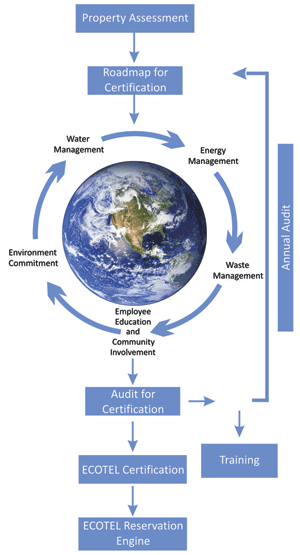ECOTEL Version 2.0 - Reaching Out - By Shamsher Singh Mann and Deepika Thadani
ECOTELs metamorphoses into a more inclusive and interactive certification, involving owners, guests, employees and the community. We see the practicality of going green through a case study analyzing Rodas, an ECOTEL, located in Mumbai, INDIA.
While the phraseology 'version 2.0' has become part of our vernacular, it is interesting to step back and reflect on what the revolutionary Web 2.0 was all about. This was different from Web 1.0 because it forsook the path of one-way communication and created a more open society of web users where dialogue and interaction became the new norm. People now communicate back to the web and freely express their views, likes and dislikes, pretty much changing the entire way we look at communication today.
ECOTEL – Version 2.0: ECOTEL began when environmentalism was not as much in vogue as it is today. We now live in a world where it has become fashionable to be green. While it is very commendable that this movement is so youthful and exciting, there remains a fear of it losing momentum before accomplishing its objectives.
The impetus, in our opinion, shall come by increasing the number of stakeholders; by making everyone a part of the solution. To do so, we have looked at all aspects of our certification and tried to work on ways and means to reach out to the employees, community and guests. We have worked on internal aspects (such as the rating and certification process and audit criteria) as well as external (setting up a reservation engine, creating a fresh website and introducing a construction globe).
The Audit Process: New ECOTELs shall be audited for their readiness status. We shall then prepare a customised blueprint for them to achieve the target standards and work with the hotel's management in achieving them. Hotels shall be rated on a graded system based on a Likert scale. Our audits shall now be annual, allowing enhanced interaction between the hotel’s management and our teams.
Rating: We are reviewing and modifying the rating system wherein hotels would need to achieve a minimum score across all five 'globes' (ECOTEL's certification verticals). Hotels will be differentiated based on the level of environment friendliness and those exhibiting higher standards shall be accordingly recognised.
Audit checklists: We are updating our checklists to ensure that they are aligned with international best practices. The checklists shall be customised based on type of property, location, geography, climate, and other considerations.
Collaboration with leading agencies across the world: In our endeavour to deliver a world class product, we are getting our certification assessed by leading domestic and international entities. Our basic standards conform to the Global Sustainable Tourism Criteria and we intend reviewing these continually.
Training process: The strength of the programme lies in its ability to have employees who believe in it. We intend concentrating on providing quality training modules for hotel employees and help in creating a more cohesive and responsive team.
Apart from this, ECOTEL is looking at introducing the following facets into the programme:
 Reservation engine: All ECOTELs shall feature on the ECOTEL reservation engine, enabling end users to directly book rooms in the participating hotels through a common website.
Reservation engine: All ECOTELs shall feature on the ECOTEL reservation engine, enabling end users to directly book rooms in the participating hotels through a common website.
Sustainable design and construction globe: Unlike other certifications like LEED, which concentrate primarily on the building structure, we focus on maximising efficiency and minimising waste generation by concentrating on improving the day-to-day operations of hotels. However, we have always understood the importance of environmentally-friendly building design and construction and shall now be introducing this aspect as a separate globe or assessment criterion for all new build hotels, making ECOTEL the first certification of its kind to certify both construction and operations.
The core strength of the certification is in its staff training programmes and community outreach initiatives. While some of our existing hotels have very strong processes, we would be paying special attention to involving the entire value chain. We shall assist hotels in spreading the message of being earth friendly to others involved, such as our vendors and suppliers and further, to those such as the waste handlers. Our comprehensive approach aims to engage the community through programs that enable a great degree of interaction with local residents and businesses.
But the most important axis in this movement is the one controlled by the business decision-maker. It is very important for businesses to understand and believe that going green is not just responsible corporate behavior, but also a smart financial decision. The cost of constructing an earth-friendly hotel is marginally higher than that of a conventional structure, adding approximately two-to-three per cent more to the overall development cost. Incorporating green best practices help in retrieving these additional costs in a couple of years. Considering that most hotels tend to have a life span averaging 15-20 years, operationally sound green practices tend to offset all costs and become an additional source of revenue, apart from bringing in other tangible and intangible benefits.
To better understand these benefits, we analyse Rodas, an ECOTEL.
